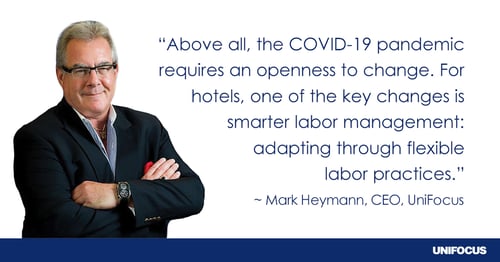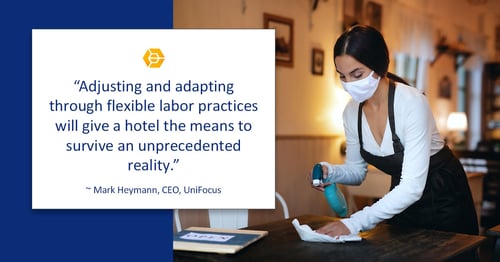July 14, 2020 - Written by Mark Heymann and Published in Hotel Online - The COVID-19 pandemic isn’t going away anytime soon, and the widespread resurgence of cases across the U.S. throughout June and July is a prime example of that. From a hospitality perspective, the unfortunate reality is clear: hotels will continue to face an uphill battle until a vaccine or effective treatment becomes available. There’s no way around it — point blank, period. The only way forward is by adapting to the circumstances in front of us.
How? Well, a good way to start is by implementing flexibility within labor management processes. Unforeseen obstacles are arising every day amid the pandemic, which further magnifies the need for a flexible approach to everything from staff scheduling and shift durations to role responsibilities and planning in real-time. In a rapidly evolving climate, hotels must evolve along with it.
However, it’s a two-way street. In order for hotels to have any chance at weathering the storm, their staff needs to be equally receptive to the flexibility concept. Gone are the days of set schedules and shift times, and single-role job positions. A new normal is here. Below are three benefits of employer/employee flexibility that can allow hotels to remain productive and profitable within it.
Helps Align Staffing to Service Levels
 Flexible labor management processes allow hotels to staff according to volatile guest volumes. Expected occupancy levels, already low to begin with, have been difficult to predict during the pandemic. And the same goes for peak service times that are fluctuating on a week-to-week basis based on consumer confidence and the state of the pandemic. As we all know, demand determines single shift staffing numbers. Miscalculating demand leads to mis-scheduling. Mis-scheduling results in overspending on employee wages for labor that isn’t needed, or underspending on employee wages that reduces the quality of service. In both cases, neither short-term nor long-term profitability is attainable.
Flexible labor management processes allow hotels to staff according to volatile guest volumes. Expected occupancy levels, already low to begin with, have been difficult to predict during the pandemic. And the same goes for peak service times that are fluctuating on a week-to-week basis based on consumer confidence and the state of the pandemic. As we all know, demand determines single shift staffing numbers. Miscalculating demand leads to mis-scheduling. Mis-scheduling results in overspending on employee wages for labor that isn’t needed, or underspending on employee wages that reduces the quality of service. In both cases, neither short-term nor long-term profitability is attainable.
While it would be nice to address these challenges by utilizing on-call staff, the work-life balance needs of employees make it a more complex issue. One solution is staff-wide cross utilization (more on that below) recognizing that, in some circumstances, schedules will need to be adjusted in real-time. This could be due to unexpected fluctuations in business volumes, last minute call-offs or other reasons for absenteeism such as illness or caretaking needs. Regardless, it’s critical that business volumes are closely matched to labor expenses for recovery to be achieved.
Helps Enhance Operational Efficiency
As noted, role flexibility will be vital to successful operations. The pandemic changed the key formula for maximizing operational efficiency, bringing the concept of cross utilization to the forefront. Cross utilization refers to the practice of training employees to perform multiple job responsibilities during a single shift, allowing hotels to provide quality service despite low labor budgets. If one employee can perform the duties of two, three or four positions by themselves, and those tasks occur at different times during the day, hotels can reduce the need for multiple people while accomplishing the same amount of work. This simple adjustment can save companies thousands of dollars on labor each month.
On a staff-wide level, cross utilization signifies a shift from job-specific labor to flexible task-oriented labor. Instead of one specific role, employees focus on the quantity of tasks they can perform as they seamlessly transition from one role to the next. The flexibility fosters staff productivity across the board, lowering the cost for hotels to provide quality service. And this type of an approach can be facilitated with adjustments to wage rates based on the number of tasks / positions an individual can handle — commonly known as a pay-for-skill system.
Helps Manage Unpredictable Availability
 The ripple effects of COVID-19 have drastically tightened staff availability levels. As children may be home from school next fall or, at a minimum, less childcare availability, employees will have added parental responsibilities that prevent them from working certain shifts. As more and more people are exposed to the virus, employees might have to take an unexpected, two-week leave of absence to self-quarantine. If they contract the virus, their time away from work could last several months. Without flexible scheduling, hotels won’t be able to align with the pandemic-related needs of their employees, thus limiting their ability to retain experienced workers essential for top-notch service.
The ripple effects of COVID-19 have drastically tightened staff availability levels. As children may be home from school next fall or, at a minimum, less childcare availability, employees will have added parental responsibilities that prevent them from working certain shifts. As more and more people are exposed to the virus, employees might have to take an unexpected, two-week leave of absence to self-quarantine. If they contract the virus, their time away from work could last several months. Without flexible scheduling, hotels won’t be able to align with the pandemic-related needs of their employees, thus limiting their ability to retain experienced workers essential for top-notch service.
By implementing flexible scheduling, hotels could afford their employees the option to change shift times and durations on a weekly basis. A front desk attendant may work three 12-hour shifts one week, followed by four 10-hour shifts the next, and five 8-hour shifts the week after. This way, that employee can tailor their schedule around their personal obligations instead of being forced to quit or significantly scale back hours. There are organizations that have already put these practices into place, but a key to their success of this approach will be advanced scheduling technology that can assist management in addressing these availability changes.
Above all, the COVID-19 pandemic requires an openness to change. For hotels, one of the key changes needs to come in the form of smarter labor management. Adjusting and adapting through flexible labor practices will strengthen their ability to align with the times, giving them the means to survive an unprecedented reality consisting of low occupancy, unpredictable demand and limited profitability potential.






